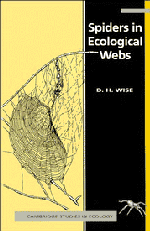Book contents
- Frontmatter
- Contents
- Preface
- Acknowledgments
- 1 The spider in the ecological play
- 2 Hungry spiders
- 3 Competitionist views of spider communities
- 4 Failure of the competitionist paradigm
- 5 How spiders avoid competition
- 6 Impact of spiders on insect populations
- 7 Anchoring the ecological web
- 8 Untangling a tangled web
- 9 Spinning a stronger story
- References
- Name index
- Subject index
Preface
Published online by Cambridge University Press: 08 January 2010
- Frontmatter
- Contents
- Preface
- Acknowledgments
- 1 The spider in the ecological play
- 2 Hungry spiders
- 3 Competitionist views of spider communities
- 4 Failure of the competitionist paradigm
- 5 How spiders avoid competition
- 6 Impact of spiders on insect populations
- 7 Anchoring the ecological web
- 8 Untangling a tangled web
- 9 Spinning a stronger story
- References
- Name index
- Subject index
Summary
Ecologists love to spin yarns. Some are wonderfully intricate tales that radiate connections spanning voids separating far-flung supports. Such spinning work dazzles but often is short lived, as is the orb web that so carefully crafted succumbs eventually to wind, rain and dew. The patient spider, not unlike the ecologist, ingests the remnants of its artwork and spins again, sometimes in another site or with a different orientation.
Others try different strategies. They pick a smaller space and spin an irregular maze that lasts longer but requires continual additions and refinements. Yet another strategy combines the two, like that of the labyrinth spider, which spins an orb to capture unwary prey but hides from enemies in an adjoining, irregular framework. And then there are the thieves, the kleptoparasites, who do not build their own webs but instead use the snares of others to make a living. Or consider the wandering spiders, webless marauders who wait in ambush or stealthily stalk their prey, who retrace the past with draglines, safety lines clutched frantically to halt the plunge to unknown depths after a wrong turn has taken them over the edge.
Analogies between ecologists and spiders become tenuous if stretched too far. The spider, for example, never becomes trapped in its own web. Neither do ecologists if they're careful. In the chapters that follow I will evaluate generalizations woven by ecologists to explain how spiders connect with other organisms, how spiders fit into their ecological webs.
- Type
- Chapter
- Information
- Spiders in Ecological Webs , pp. xi - xiiPublisher: Cambridge University PressPrint publication year: 1993



